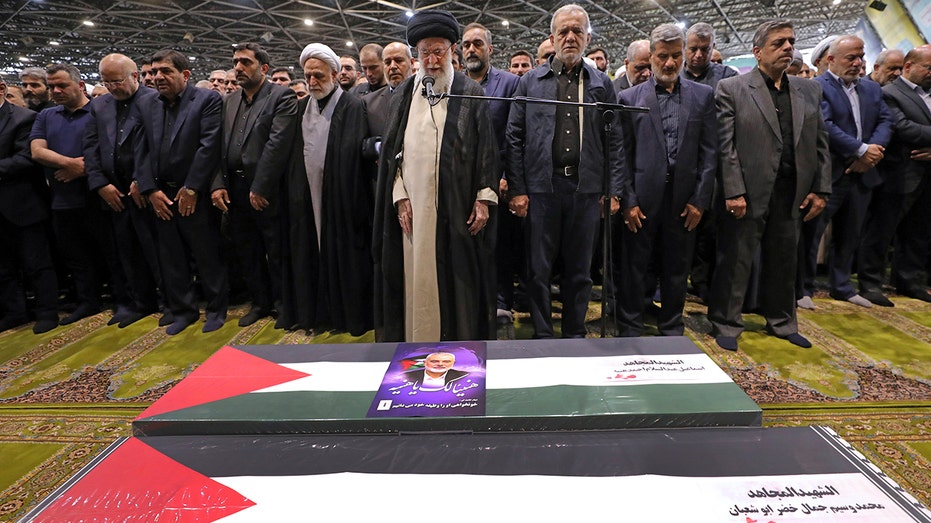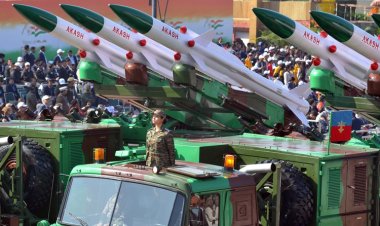Iran could attack Israel in less than 24 hours, sources say, as Western powers issue Tehran a warning
Regional sources tell Fox News that Iran and its proxies could launch an attack on Israel within the next 24 hours as Western powers are calling on Tehran to show restraint.

Western powers have issued a joint statement Monday warning Iran and its allies to "refrain from attacks that would further escalate regional tensions" in the Middle East as they appear to soon be heading toward a breaking point.
Regional sources told Fox News foreign correspondent Trey Yingst on Monday that they are concerned Iran and its proxies could attack Israel within the next 24 hours in retaliation for the killing of Hamas political leader Ismail Haniyeh in Tehran late last month. The message from France, Germany and the United Kingdom – which calls on Israel and Hamas to show "no further delay" in getting back to the negotiating table to hammer out a cease-fire and hostage release deal – also comes as Lebanon is bracing for a wider war and the Islamic State is plotting its re-emergence.
"We are deeply concerned by the heightened tensions in the region, and united in our commitment to de-escalation and regional stability. In this context, and in particular, we call on Iran and its allies to refrain from attacks that would further escalate regional tensions and jeopardize the opportunity to agree a ceasefire and the release of hostages," wrote French President Emmanuel Macron, German Chancellor Olaf Scholz and U.K. Prime Minister Keir Starmer.
"They will bear responsibility for actions that jeopardize this opportunity for peace and stability," the leaders added. "No country or nation stands to gain from a further escalation in the Middle East."
However, on Sunday, the Palestinian terrorist group Hamas said it would not participate in new negotiations for a cease-fire in Gaza this week unless mediators presented a plan based on previous talks.
Hamas, which is still holding dozens of hostages including Americans, said it has shown "flexibility" throughout the negotiating process but that suspected Israeli actions – including the assassination of Haniyeh – indicate it is not serious about pursuing a cease-fire agreement.
Tensions are also rising Monday between Israel and its northern neighbor, Lebanon.
On Monday, the Lebanon-based terrorist group Hezbollah launched 30 rockets into northern Israel, although no casualties were reported, according to the Israeli Defense Forces (IDF).
"Following sirens that sounded a short while ago in northern Israel, approximately 30 projectiles were identified crossing from Lebanon toward the area of Kabri, a number of which fell in open areas," an IDF spokesman said.
The Washington Post reported that Hezbollah "appears undeterred" against Israel despite enduring months of airstrikes, which have taken out an estimated 400 of its fighters.
Instead, the militants have ramped up the intensity of their attacks and are now striking Israeli towns they claim to previously have not been targeted, according to the newspaper.
One of the most notable attacks happened at the end of July, when 12 children and teenagers were killed in a rocket attack targeting the village of Majdal Shams in the Israeli-controlled Golan Heights.
In response to that violence, the IDF carried out a retaliatory airstrike in Beirut, which killed the Hezbollah commander accused of orchestrating the massacre.
Following that official’s death, Hezbollah leader Hassan Nasrallah delivered a speech in which he seemed to preview Lebanon becoming involved in a wider conflict, saying that "The Israelis are the ones who chose this escalation with Lebanon," according to The Washington Post.
Michael Young, a senior editor at the Carnegie Middle East Center, told the newspaper that "we are in a situation where the rhythm imposed by Hezbollah trying to contain the conflict is no longer possible, it seems – partly because the Israelis appear willing to expand it."
Elsewhere in the Middle East, the Islamic State terrorist group is making a resurgence in Syria, The Wall Street Journal reports.
The newspaper, citing officers from the U.S. and the Syrian Democratic Forces, reports that ISIS is building up its ranks again in Syria’s Badiya desert by training young recruits to become suicide bombers and directing attacks on allied troops.
In response, U.S. aircraft are carrying out airstrikes and providing aerial surveillance for the Syrian Democratic Forces' (SDF) ground operations against suspected ISIS cells.
"This year has been the worst year since we defeated Islamic State," SDF Gen. Rohilat Afrin told The Wall Street Journal. "No matter how much you knock them down, they'll try to get up again."
The newspaper reports that ISIS so far has claimed responsibility for 153 attacks in Syria and Iraq through the first six months of this year.
"What we're seeing is the movement of men, weapons and equipment," an American special forces officer stationed in Syria was quoted as saying.
The tensions in the Middle East are also spilling over stateside.
In New York City, a 22-year-old Brooklyn man is now facing a hate crime charge after stabbing a man this past weekend after yelling "Free Palestine" and "Do you want to die?" according to The New York Times.
Fox News’ Bradford Betz and The Associated Press contributed to this report.






















